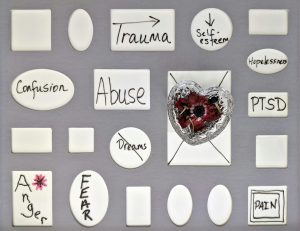The Secret Ingredient in Therapy That Sparks Transformation at All Ages
The Secret Ingredient in Therapy That Sparks Transformation at All Ages
At the heart of every successful therapeutic journey lies one essential ingredient: The importance of the therapist-client relationship. This isn’t just about how well the therapist and client get along—it’s about building a relationship rooted in trust, empathy, collaboration, and safety. Regardless of a client’s age—whether they’re a child navigating big emotions, a teen wrestling with identity, or an adult working through life’s challenges—the strength of the therapeutic relationship can determine the depth and effectiveness of the work we do together.
>>>FREE DOWNLOAD: Mental Health Handbook for Teen Girls <<<
An eBook with 10 mental health exercises every teen girl needs to know to:
- Improve focus
- Boost happy hormones naturally
- Cope with trick feelings
- Develop self-compassion

The Healing Power of Connection
What is the Therapeutic Alliance (therapist-client relationship)?
The therapeutic alliance refers to the professional relationship between therapist and client. It includes mutual respect, shared goals, and a sense of partnership. When clients feel seen, heard, and valued, they are more likely to engage deeply, explore vulnerable topics, and take steps toward meaningful change.
Why It Matters Across All Age Groups
The importance of the therapist-client relationship matters uniquely across the following age groups:
Children need to feel emotionally safe before they can express their inner world. A strong alliance allows them to trust the process and the person guiding them through it. Play, storytelling, and non-verbal communication flourish when children feel connected to their therapist.
Teens often test boundaries and may approach therapy with skepticism. A solid therapeutic relationship reassures them that therapy is a space where they won’t be judged but rather understood. It creates a foundation where they can explore their identity, stressors, and relationships with honesty.
Adults benefit from a collaborative relationship where they feel empowered and supported. Life’s complexities—career, family, identity, mental health—require a space where they can process freely, gain insight, and receive consistent emotional support.

The Evidence Speaks on the The importance of the therapist-client relationship
Research consistently shows that the therapeutic alliance is one of the most significant predictors of positive treatment outcomes. In fact, some studies suggest that the quality of the alliance is even more important than the type of therapy used. This holds true across different mental health issues, cultural backgrounds, and age groups.
My Approach to Building Connection
In my work at Pyramid Psychology, I prioritize the person before the problem. I aim to create a space where clients feel respected and empowered. Whether it’s walking alongside a young person as they make sense of their feelings or supporting an adult through major life transitions, my focus is on showing warmth, authenticity, and clinical skill.
No two therapeutic relationships look the same—because no two clients are the same and that is the importance of the therapist-client relationship. I take the time to get to know who you are beyond your challenges, helping you tap into your strengths and take ownership of your growth.
Love,
Chipo
Now Accepting New Clients
If you or someone you care about is looking for support, I am currently accepting new clients at Pyramid Psychology. Whether you are seeking therapy for yourself, your child, or your teen, I would be honored to walk alongside you on your journey toward healing and growth.
Let’s build something meaningful together.
📧 Book a consult call
📞 587) 803-2968
🌐 Learn about me here
Register Social Worker offering counseling for female identifying teens (11-21 years old)

Chipo Bvindi, Therapist at Pyramid Psychology
About Chipo
Chipo is a Registered Social Worker with a Master’s in Clinical Social Work, providing compassionate and culturally competent therapy to teens, adults, and families. With advanced training in Trauma-Informed Therapy, Narrative Therapy, Cognitive Behavioral Therapy (CBT), Dialectical Behavioral Therapy (DBT), Acceptance and Commitment Therapy (ACT), and Mindfulness.
Chipo helps clients address a range of challenges, including anxiety, depression, trauma, grief, and life transitions. Through a trauma-informed, anti-oppressive, and intersectional lens, Chipo creates a safe and inclusive environment where each client feels genuinely heard and understood. As a Black therapist, Chipo brings a nuanced perspective on identity, culture, and systemic issues, offering an approach that deeply respects each person’s experiences. Whether you are a teen discovering yourself, an adult managing stress, or a family working through relationship dynamics, Chipo’s personalized approach aims to meet your unique needs.
Beyond the therapy room, faith, family, and friendships provide Chipo with strength and balance. Chipo finds peace in nature through walking, journaling, and appreciating life’s small moments. When it’s time to relax, Chipo enjoys Korean dramas, city adventures, and reading for pleasure. Sometimes, you’ll find Chipo embracing a playful side through art, dancing, or even building sandcastles—because life is meant to be lived fully!
Ready to take the next step? Book a free consultation today, and let’s work together toward your path to healing and personal growth.
MYTH: social workers only get involved with child welfare cases. TRUTH: social workers bring a holistic experience for teens fighting systemic barriers to mental health. Learn more HERE




 About Chipo
About Chipo


 I am a registered social worker with a Bachelor of Social Work with a major in psychology from the university of the Western Cape, and a Master’s in Clinical Social Work specialization with individuals, families, and groups from the University of Calgary.
I am a registered social worker with a Bachelor of Social Work with a major in psychology from the university of the Western Cape, and a Master’s in Clinical Social Work specialization with individuals, families, and groups from the University of Calgary.





